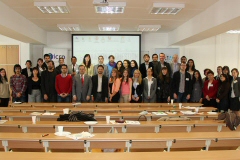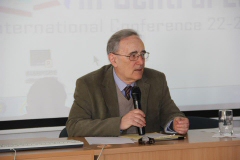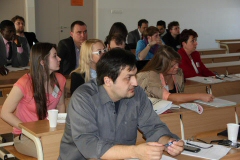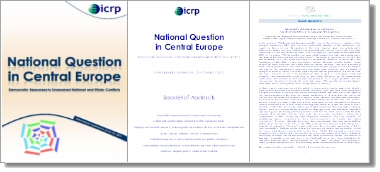National Question in Central Europe:
Democratic Responses to Unresolved National and Ethnic Conflicts
International Conference – 22−24 March, 2013
Conference topics
Political, economic and legal aspects in ethnic and national minority conflict resolution. Cultural diversity of Central Europe. Impacts of European Union accession policies/processes.
Aims
This interdisciplinary and cross-cultural meeting welcomes presentations on the cultural studies, sociology, geography, political science, law, history and economics research and cross border cooperation within the wider Central European region. The conference is supported by the Institute for Cultural Relations Policy (ICRP) and King Sigismund College (ZSKF). Its aim is to serve as a meeting point to facilitate the public exposure of the perspectives and interests of different communities, governments, international organisations, NGOs, businesses, scholars, thinkers and common citizens.
Booklet of Abstracts [pdf] Conference Proceedings [pdf]
Programme summary
Invited speakers include diplomats, scholars, acting and former leading politicians or government officials from across Central and Eastern Europe.
• Prof. Dr. Tibor Várady Former Minister of Justice of the Federal Republic of Yugoslavia. University Professor at the Legal Studies Department of the Central European University, Budapest, Hungary. Member of the Hague Permanent Court of Arbitration. Member of the Serbian Academy of Sciences and Arts and the Hungarian Academy of Sciences.
• Dr. Levente Salat President of the Ethnocultural Diversity Resource Center (EDRC Romania), Associate Professor at Babeş-Bolyai University, Cluj, Romania. Member of the Scientific Council of the Research Institute of Ethnic and National Minorities, Hungarian Academy of Sciences.
• Oľga Gyárfášová PhD Co-founder, Program Director and Senior Research Fellow of the Institute for Public Affairs (IVO Slovakia) and lecturer at Comenius University in Bratislava, Slovakia.
• Ádám Szesztay Director of the Strategic Planning Department of the Hungarian Ministry of Foreign Affairs.
• Prof. Dr. Lia Pop Dean of Faculty of Political Science and Media Studies, University of Oradea, Romania.
• Katinka Beretka Member of the Hungarian National Council in Serbia.
See the full list of authors and titles of accepted papers here >>>>
• Conference days consist of lectures by invited speakers, members of ICRP Advisory Board as well as presentations of guest speakers and Q&A sessions. Optional sightseeing programmes on last day of conference.
• Best presentations will be selected by a panel of judges and awarded during the closing ceremony.
• Submitted and confirmed papers will be published online and will be archived on DVDs.
• In case of large number of participants, papers will be published in conference book as well.
• The main language of the conference is English (English and Hungarian for guest speaker applicants).

Conference themes
(Possible directions may include, but are not restricted to, the following)
• Regional development path of Central and Eastern Europe;
• Central and Eastern Europe compared to other European regions;
• Changing transnational structures of demography, interethnic relations, settlements and production;
• Society, Culture, Religions, Lifestyle;
• Economic issues;
• Modernisation processes (state administration, law, politics, ideologies);
• Culture and Art in Central Europe;
• Nation building, national ideologies, national identity question, ethnic minority issues;
• Diplomacy, diaspora policies and interstate relations
Conference location
King Sigismund College (Zsigmond Kiraly Foiskola). Kelta utca 2. Budapest (1039) Hungary
Benefits of attending
• The opportunity to present your research within a unique forum and collaborate with experts from wider regions and around the world;
• Conference papers/abstracts are peer-reviewed by members of ICRP international Advisory Board;
• Published papers in electronic format (Proceedings available on DVD and in on ICRP website, where they will remain accessible to thousands of researchers and practitioners worldwide.);
• Get in touch with different views and new approaches;
• A chance to promote your research by presenting it to relevant people and organizations (active politicians, decision-makers, diplomats);
• To get more knowledge about foreign relations of the Eastern and Central European countries;
• Tea, coffee and refreshments will be served during the program. (Lunch not included in the price);
• Group sightseeing in Budapest is also part of the program.
| Day 1 | |||
| Time | Mins | Session | |
| 1000-1030 | 30 | Registration | |
| 1030-1110 | 40 | Tibor Várady (fmr. Yugoslav Minister of Justice) | |
| 1110-1120 | 10 | Q&A | |
| 1120-1135 | 15 | József Bayer (Rector, King Sigismund College) | |
| 1135-1140 | 5 | Csilla Morauszki (CEO, ICRP) | |
| 1140-1200 | 20 | Coffee, tea, refreshments | |
| 1200-1230 | 30 | Ádám Szesztay (Director of Department, MFA, Hungary) | |
| 1230-1240 | 10 | Q&A | |
| 1240-1310 | 30 | Katinka Beretka (Hungarian National Council, Serbia) | |
| 1310-1320 | 10 | Q&A | |
| 1320-1430 | 70 | Lunch | |
| 1430-1830 | 240 | Presentations of Guest Speakers | |
| Day 2 | |||
| Time | Mins | Session | |
| 1100-1130 | 30 | Lia Pop (Dean of Faculty, University of Oradea, Romania) | |
| 1130-1140 | 10 | Q&A | |
| 1140-1210 | 30 | Olga Gyárfášová (Program Director, IVO, Slovakia) | |
| 1210-1220 | 10 | Q&A | |
| 1220-1250 | 30 | Levente Salat (President of EDRC, Romania) | |
| 1250-1300 | 10 | Q&A | |
| 1300-1400 | 60 | Lunch | |
| 1400-1500 | 60 | Experience Balkan workshop | |
| 1500-1900 | 240 | Presentations of Guest Speakers | |
| Day 3 | |||
| Time | Mins | Session | |
| 1000-1300 | 180 | Interethnic Walking Tour | |
| 1300-1400 | 60 | Lunch break | |
| 1400-1600 | 120 | Sightseeing tour (City Centre) | |
How to apply for participation (listeners)?
The application is a two-step procedure and it includes the submission of Registration Form to conference@culturalrelations.organd payment of registration fee (45 EUR*). Deadline of submission & payment: 11 March, 2013.
How to apply for paper presentation (speakers)?
The application is a two-step procedure and it includes the submission of Registration Form to conference@culturalrelations.organd payment of registration fee (90 EUR*). Deadline of submission: 11 March, 2013. Authors will be notified of conditional acceptance or rejection within 5 working days after each submission. Registration fee shall be paid by bank transfer OR cheque prior to event OR at the same time as first day registration.
* NOTE that the international money transfer fee is 15 EUR. If you intend to transfer the conference fee outside Hungary the total sum will be 60 EUR for listener registration and 105 EUR for speakers. In order to reduce money transfer costs, speakers are entitled to make payment in cash during the registration (original speaker registration fee 90 EUR).
Submitted abstracts will be evaluated by an international reviewing committee.
Authors will be notified of conditional acceptance or rejection in 5 working days after submission
Event organised by the Institute for Cultural Relations Policy
in cooperation with King Sigismund College of Budapest
The event targets a broad spectrum of undergraduate, PhD student, candidate,
lecturer and researcher participants, recognising the multidisciplinarity of
research in international relations and other related disciplines
National Question in Central Europe – International Conference venue
King Sigismund College of Budapest
The Conference venue is located in the 3th district, on Kelta utca.
ICRP is happy to purchase Budapest transportation ticket upon request. A Budapest 24-hour travel card costs 6 euros and Budapest 72-hour travel card costs 15 euros. If you would like us to buy any of these travel cards for you please transfer the additional sum (6 or 15 euros) with the participation cost. Please transfer the accommodation and transportation cost together with the participation cost.
Public transport ticket information >>>>
By suburban railway:
• Take 10 stops by suburban railway H5 from Batthyány tér to Békásmegyer station. (Suburban railways start in every 10 minutes daily)
By bus:
• bus nr. 134 from Szentlélek tér (Árpád híd, Buda side) to Újmegyeri tér bus terminal.
• bus nr. 34 from Árpád híd metro station (M3, Pest side) to Újmegyeri tér bus terminal.
• bus nr. 204 from Rákospalota, Kossuth utca, Újpest Központ metro station to Békásmegyer suburban railway station.
By car:
• Zsigmond Király Főiskola (access car park from the directon of Bálint György u. 20.)
• A minute from Route 11 and M0 motorway (ring)
GPS (WGS) coordinates:
N 47 36 3.06 / 47.6008513
E 19 3 48,9 / 19.0635846
We are looking forward to welcoming You here!
Contact us:
Email: institute@culturalrelations.org
National Question in Central Europe
List of keynote speakers and presenters:
| █ Keynote speakers |
|
| Prod Dr. Tibor Várady | Opening Speech |
| Levente Salat, PhD | The Chances of a Democratic Response to the Romanian-Hungarian Dispute |
| Ol’ga Gyárfášová, PhD | A Plaidoyer for Diversity |
| Prof. Dr. Lia Pop | Roma people in the Romanian National Elections 2012 |
| Ádám Szesztay | Diplomacy, diaspora policies and interstate relations in the Hungarian foreign policy strategy |
| Katinka Beretka | Territorial autonomy of Vojvodina and its national minority aspects with special focus on the decision of the Constitutional Court of Serbia |
| █ Presenters |
|
| Danko Aleksić & Vladimir Đorđević: | Nationality (Citizenship) vs. Ethnicity. Clash of Identities in Bosnia and Herzegovina |
| Dadiana Chiran | Roma economic empowerment. Roma-minority between welfare state and poverty policies. Perspectives from Hungary and Romania. |
| Wojciech Gizicki, PhD: | Politics and Democracy as Conceived by Visegrad Generations |
| Prof. Jovan Ananiev, PhD & Assoc. Prof. Jadranka Denova, PhD: | Citizens Participation at Local Level in the Republic of Macedonia
|
| Prof. Jovan Ananiev, PhD & Assoc. Prof. Jadranka Denova, PhD: | Preconditions for efficient public administration in the Republic of Macedonia
|
| Grigor Grigoryan: | Perspectives of the Karabakh conflict resolution on the context of Kosovo independence: legal aspect |
| Jubjana Vila: | Kin Ethnic Group Mobilization: Ethnic Albanians in Kosovo and Macedonia |
| Sándor Földvári: | Serbian National Awakening and Enlightenment as Inspired by the West Ukrainian Cultural Centres – Transmitted through the Hungarian Kingdom in the 18th Century |
| Reina Zenelaj Shehi: | Mediation in Regional Ethnic Conflicts: The Role of EU in Kosovo |
| Dr. Boglárka Koller, PhD: | European identity in flux. Identity patterns in a multi-speed Europe with special focus on the Central-, Eastern Europeans’ collective attachments |
| Dr. Ada-Charlotte Regelmann: | Toeing the Line? Political Participation of Ethnic Minorities in Central Europe |
| Piotr Andrzejewski: | Modernising nationalism. The case of Jörg Haider |
| Dr. Irina Pop: | The image of the State Reform (Regions) in the regional media. Bihor County case |
| Dr. Edit Lőrinczné Bencze, PhD: |
The Impact of European Accession on Regional Policy Reform in Croatia |
| Pavlo Moroz & Kyrylo Brazhko: |
Corporate Tax Rate as an Instrument of Fiscal Policy in EU Countries in Innovation Development Enhancing |
| Kristiāna Kalniņa: | National Question of Latvian electoral politics after regaining independence |
| Dr. Lulzim Murtezani: | The ethnic diversity and the value orientations of the adolescents: differences and similarities |
| Dr. Fethullah Bayraktar: | The remedial secession theory: Is it a democratic response to unresolved national and ethnic conflict? |
| Dr. Łukasz Lewkovicz, PhD: |
20 years of Polish-Slovak neighbourhood (1993-2013): conditions, problems and implications |
| Assist Prof. Dr. Yuliya Biletska: |
“Clash of Memories”: ethic identities and interethnic relations in Crimea |
| Nargiza Tashtemirova: | Legal aspects in ethnic conflict resolution. (International Law and State Law) |
| Daniela Javorics: | The national question in Western Hungary around the First World War or how people start to question their identity |
| Edgár Dobos: | Did ethnic cleansing succeed? The constraints on the international attempt to reverse ethno territorialization and stimulate minority return in Bosnia-Herzegovina |
| Aleksandar Raič, PhD & Suzana Kujundžić Ostojić: | Bunjevci and Croats in Serbia: Problem of democratic solution of an ignored ethnic conflict
|






